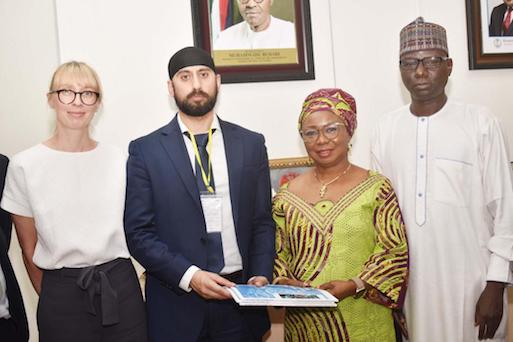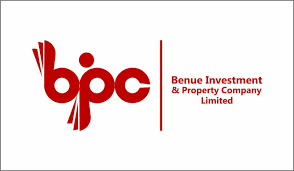Business News
DFID, FCA Partner SEC on Fintech

By Tony Obiechina, Abuja
The Department For International Development, DFID, Financial Conduct Authority, FCA and the Securities and Exchange Commission, SEC have agreed to collaborate to develope the Fintech space in Nigeria.
Speaking when she received officials of both organisations in Abuja weekend, Acting Director General of SEC, Ms.
Mary Uduk said SEC was enthusiastic about the collaboration as it would encourage responsible use of new technologies and digital finance in the capital market, influence increased international participation & cooperation, and also provide investors with more choices in the Nigerian Capital Market.She said SEC is looking to adopt regulatory and supervisory practices for orderly development and stability of Fintech, as the Commission will pay close attention to sustaining confidence and safeguarding the integrity of the market.
“In this way, our policies will facilitate the safe entry of new products, activities and intermediaries. In addition, we will ensure that regulation does not stand in the way of innovation”.
She said While it is clear that FinTech has already made huge inroads into many aspects of the financial industry, what is perhaps even clearer is that the surface has barely been scratched in relation to what FinTech can do for us in the future.
According to her “The awareness of customers that their data might be prone to cyber-attacks could make them lose trust in digital channels until strong consumer protection frameworks are in place. These frameworks for digital financial services will be critical in building confidence for consumers.
“We have come up with ways to monitor the risks that may come up. It’s like a sandbox, but not an enclave. We are building capacity to train young people that would be able to drive the process.
“We hope that this year will be a turning point. We are trying to gather as much information as we can to be able to contextualise and synthesise regulation in Nigeria
“Young people are begining to get interested in investment and they are doing this via Fintech and that is why we are doing all that we can to develop rules around it so that the risk will be mitigated and it will further develop the market
In his remarks, Senior Adviser, UK DFID, Mr Richard Sandall, said DFID and FCA have a partnership to support FCA to step into new jurisdictions to deliver DFID objectives in certain areas.
He said, “We are in Nigeria to look at the FinTech environment, regulatory environment and see if there are ways the Fintech environment can be built.
“We are very interested in the impacts that Fintechs in Nigeria would have in the UK. We know that Nigeria has Fintechs and the FCA has already established international networks.
He said the agreement with FCA is for up to two years and during that time modalities would be put in place to work with regulators and that is why they have come to the SEC.
“We know the SEC has enthusiasm for Fintech and we want to help develop it as much as we can” Sandall added.
Also speaking, Nigeria Lead, FCA, Mr Parma Bains, said they have done some work with the SEC in the past and are very comfortable working with the Commission.
Brains expressed appreciation to the SEC for the opportunity to collaborate and expressed the belief that it is the begining of many collaborative relationship that will span for the next two years of the project.
“We are available to provide collaboration and assistance in the area of Fintech and we are also open to learn how you regulate the market and some other roles you perform” Bains added.
On her part, Technical Specialist, FCA Barr Alicia Kedzierski
Said she was impressed by the depth your research has taken, the fact that you have gone to various jurisdictions to try to find out what is happening is a good step.
“SEC Nigeria is the first regulator that we have seen that looks into the millennial and the risks that could lead to long term issues.
“There has to be balance, regulation as well as ensure that they are not closed out” she said.
A statement by SEC Head of Public Communication, Mrs Efe Ebelo said “the idea behind the UK-Africa Fintech partnership is to connect African entrepreneurs with British fintech investors and business mentors to access the finance and advice needed to start and grow their companies”.
According to the statement, “the UK’s Financial Conduct Authority (FCA) will work with its regulatory counterparts in Africa. A dedicated fund worth up to £2m will support Nigerian start-ups”.
Business News
Tinubu Congratulates Dangote on World Bank Appointment

By Jennifer Enuma, Abuja
President Bola Tinubu has congratulated Alhaji Aliko Dangote, the President of Dangote Group, on his appointment to the World Bank’s Private Sector Investment Lab, a body tasked with promoting investment and job creation in emerging economies.
In a statement by Special Adviser on Media and Publicity, Bayo Onanauga, the President described the appointment as apt, given Dangote’s rich private sector experience, strategic investments, and many employment opportunities created through his Dangote Group.
The Dangote Group became one of Africa’s leading conglomerates through innovation and continuous investment.
Dangote Group’s business interests span cement, fertiliser, salt, sugar, oil, and gas. However, the $20 billion Dangote Petroleum Refinery and Petrochemicals remains Africa’s most daring project and most significant single private investment.
“President Tinubu urges Dangote to bring to bear on the World Bank appointment his transformative ideas and initiatives to impact the emerging markets across the world fully” the statement said.

The World Bank announced Dangote’s appointment on Wednesday, as part of a broader expansion of its Private Sector Investment Lab. The lab now enters a new phase aimed at scaling up solutions to attract private capital and create jobs in the developing world.
The CEO of Bayer AG, Bill Anderson, the Chair of Bharti Enterprises, Sunil Bharti Mittal, and the President and CEO of Hyatt Hotels Corporation, Mark Hoplamazian, are on the Private Sector Investment Lab with Dangote.
The World Bank said the expanded membership brings together business leaders with proven track records in generating employment in developing economies, supporting the Bank’s focus on job creation as a central pillar of global development.
Business Analysis
Nigeria Customs Generates over N1.75trn Revenue in 2025
By Joel Oladele, Abuja
The Nigeria Customs Service (NSC) has generated an impressive N1,751,502,252,298.05 in revenue during the first quarter of 2025.
The Comptroller-General (CG) of the Service, Bashir Adeniyi, disclosed this yesterday, during a press briefing in Abuja.
According to Adeniyi, the achievement not only surpasses the quarterly target but also marks a substantial increase compared to the same period last year, reflecting the effectiveness of recent reforms and the dedication of customs officers across the nation.
“This first quarter of 2025 has seen our officers working tirelessly at borders and ports across the nation.
I’m proud to report we’ve made real progress on multiple fronts—from increasing revenue collections to intercepting dangerous shipments,” Adeniyi stated.He attributed this success to the reforms initiated under President Bola Tinubu’s administration and the guidance of the Honourable Minister of Finance and Coordinating Minister of the Economy, Olawale Edun.
The CG noted that the revenue collection for Q1 2025 exceeded the quarterly benchmark of N1,645,000,000,000.00 by N106.5 billion, achieving 106.47% of the target. This performance represents a remarkable 29.96% increase compared to the N1,347,705,251,658.31 collected in Q1 2024.
Adeniyi highlighted the month-by-month growth, noting that January’s collection of N647,880,245,243.67 surpassed its target by 18.12%, while February and March also showed positive trends.
“I’m pleased to report the Service’s revenue collection for Q1 2025 totaled N1,751,502,252,298.05.
“Against our annual target of N6,580,000,000,000.00, the first quarter’s proportional benchmark stood at N1,645,000,000,000.00. I’m proud to announce we’ve exceeded this target by N106.5 billion, achieving 106.47% of our quarterly projection. This outstanding performance represents a substantial 29.96% increase compared to the same period in 2024, where we collected N1,347,705,251,658.31.
“Our month-by-month analysis reveals even more encouraging details of this growth trajectory,” Adeniyi said.
In addition to revenue collection, Adeniyi said the NCS maintained robust anti-smuggling operations, recording 298 seizures with a total Duty Paid Value (DPV) of ₦7,698,557,347.67.
He stated that rice was the most seized commodity, with 135,474 bags intercepted, followed by petroleum products and narcotics.
“From rice to wildlife, these seizures show our targeted approach,” Adeniyi remarked, noting the NCS’s commitment to combating smuggling and protecting national revenue.
Adeniyi also highlighted key initiatives, including the expansion of the B’Odogwu customs clearance platform and the launch of the Authorized Economic Operators Programme, which aims to streamline processes for compliant businesses. The NCS’s Corporate Social Responsibility Programme, “Customs Cares,” was also launched, focusing on education, health, and environmental sustainability.
Despite these achievements, the CG noted that the NCS faced challenges, including exchange rate volatility and non-compliance issues. Adeniyi acknowledged the need for ongoing adaptation and collaboration with stakeholders to address these challenges effectively.
Looking ahead, the NCS aims to continue its modernization efforts and enhance service delivery, ensuring that it remains a critical institution in Nigeria’s economic and security landscape.
“Results speak louder than plans; faster clearances through B’Odogwu, trusted traders in the AEO program, and measurable food price relief from our exemptions. We’ll keep scaling what works,” he concluded.
BUSINESS
NSIA Net Assets Hit N4.35trn in 2024
By Tony Obiechina Abuja
The Nigeria Sovereign Investment Authority (NSIA) yesterday disclosed that its net assets grew from N156bn in 2013 to N4.35 trillion in 2024.
Similarly, the Authority has remained profitable for 12 consecutive years, leading to cumulative retained earnings of N3.
74 trillion in 2024.Managing Director and Chief Executive Officer of NSIA, Aminu Umar- Sadiq made these disclosures at a media engagement in Abuja, highlighting its audited financial results for the 2024 fiscal year.
According to him, the results underscored the resilience of the authority’s investment strategy and the strength of its earnings, driven by a well-diversified revenue base and robust risk management practices, despite a challenging global macroeconomic and geopolitical environment.
Total operating profits, excluding share of profits from associates and Joint Venture (JV) entities, increased from N1.17 trillion in 2023 to N1.86 trillion in 2024, driven by the strong performance of
NSIA’s diversified investment portfolio, infrastructure assets, gains from foreign exchange movements, and derivative valuations.
In addition, Total Comprehensive Income (TCI), inclusive of share of profits from associates and JV entities, reached N1.89 trillion in 2024, reflecting a 59 per cent increase from N1.18 trillion in 2023.
Core TCI (excluding foreign exchange and derivative valuation gains) rose by 148 per cent to N407.9 billion in 2024 compared to N164.7 billion in 2023, supported by robust returns on financial assets measured at fair value through profit and loss, including collateralised securities, private equity, hedge funds, and Exchange-Traded Funds (ETFs).
Umar-Sadiq said the authority’s outstanding financial performance in 2024 reflected the “strength of our strategic vision, disciplined execution and unwavering commitment to sustainable socio-economic advancement.”
He said, “By leveraging innovation, strategic partnerships and sound risk management, we have not only delivered strong returns but also created value for our stakeholders
“As we move forward, we remain focused on driving economic transformation, expanding opportunities, scaling transformative impact and ensuring long-term prosperity for current and future generations of Nigerians.”
The CEO reaffirmed the authority’s commitment to managing the country’s SWF, and delivering the mandates enshrined in the NSIA Act.
He said NSIA remained poised to continually create long-term value for its stakeholders by delivering excellent risk-adjusted financial results, developing a healthy and well-diversified portfolio of assets and large-scale infrastructure projects, and enhancing the desired social outcomes.
He noted that NSIA was committed to its mandate of prudent management and investment of Nigeria’s sovereign wealth.
“In adherence to its Establishment Act, NSIA prioritises transparency, disclosure, and effective communication with all stakeholders and counterparties,” he said.
He pointed out that in the year under review, a new board, led by Olusegun Ogunsanya as Chairman, was appointed by President Bola Tinubu, in accordance with the provisions of the NSIA Act.
The new board will provide strategic direction and oversight, in addition to playing a pivotal role in critical decision making.
He remarked that under the guidance of the Board, the Authority will retain focus on its primary mandate of creating shared value for all stakeholders based on its continued adoption of corporate governance practices.
“NSIA prides itself an investment institution of the federation established to manage funds in excess of budgeted oil revenues and its mission is to play a pivotal role in driving sustained economic development for the benefit of all Nigerians through building a savings base for the Nigerian people, enhancing the development of the county’s infrastructure, and providing stabilisation support in times of economic misadventure,” he added.
























